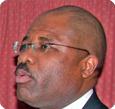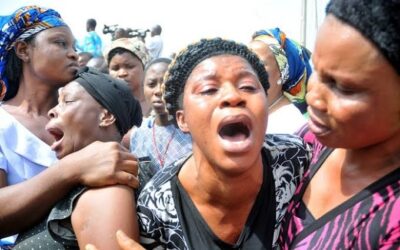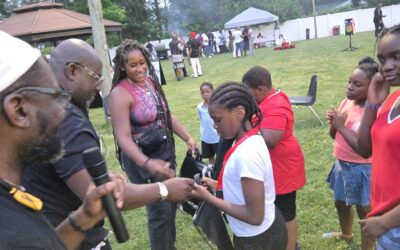Yet another testing general election confronts Nigerians on 28 March and 11 April 2015. These elections, at which we Nigerians will select our elected leaders, represent a significant milestone in the continuing development of Nigeria’s politics.
The democratic election of our leaders by the ballot box is a process that has now become so entrenched that it makes the previous military process an almost forgotten route of desirable antiquity. It is this relatively settled state of periodic leadership change that means that at these critical times, Nigerians should be entitled to consider, far more carefully the premises upon which these choices are made. This desirable scrutiny emphasises the importance of ensuring participatory involvement in the form of real exercise of choice as an integral aspect of the entire process.
These candidate selection processes have already taken place within the political party framework. Some of the choices made within that process, across all parties, by the exercise commonly referred to as the “primaries”, appeared to reflect the exact extent – and backwardness – of Nigeria’s development in the exercise of critical democratic choice. The stakes in this process were, for many of the participants, so high that the recklessness and abandon with which some of the primaries were conducted, across most of the political parties, clearly demonstrates a level of anxious concern about the integrity and transparency of the processes.
But it would be churlish to suggest that this process, bereft at virtually every level, of fairness and transparency, effectively forecloses the important question of how Nigerians make their choice of leaders from those presented. These elections, ideally and more importantly, should constitute the true testing ground of those parameters and the extent to which this works in the utopic selection of those who occupy elective positions across the political strata. At its conclusion, the expectation is that the elections would produce an outcome acceptable to all because it would reflect the fairest result from a keenly contested, predominantly transparent process. But the harsh reality is that true position will be a long way from this ideal situation.
The Nigerian electorate has, since 1999, been presented with partisan choices of political parties in various forms. In this election, the Peoples Democratic Party (PDP) and All Progressives Congress (APC) represent, by sheer spread and leadership of various state and federal governments, the largest of the two parties. On face value, it is tempting to conclude that the strength of the leading parties connotes an even distribution of politicians or following, utilizing a participatory spread that minimizes ethnic or sectional friction within and outside these political entities. Closer scrutiny clearly does not bear this out. Oddly, what appears to have happened merely masks what is, and remains, a subsisting problem that Nigeria, as a country, continues to flummox over by the refusal and/or reluctance to restrict and remove the consequences of ethnic parameters in the management of our political fortunes. Indeed at no other time of this nation’s existence is the consequence of this artificial and quite dangerous delineation more prominent than in the process of these current elections.
The history of ethnicity in Nigeria – described in many guises as tribalism or tribe-based alliances – remains as live as it has been, almost from Independence. From the 1960 emergence of these ethnic lines, the mutation has persisted, in epidemic proportions. It was its propagation that led to the ethnic hostility that produced the Civil war between 1967 and 1970. There is no discussion of the Nigerian Civil war that is anything but controversial, if not divisive. Its occurrence and consequences reflect probably Nigeria’s most difficult existential challenge not only by the sheer enormity of the damage that it caused the collective populace but by the stubbornly persistent manifestation of its root causes in the country, to date. Much of the recent analysis and review occurred following the late Professor Chinua Achebe’s publication of his book, There Was A Country. Essentially a rendition of his personal account, he offered a gripping and forthright factual account of events leading up to the war and the manner in which this was prosecuted. In his unique style, this masterful storyteller’s graphic narration makes its reading so spellbinding it nearly even moulds the indescribable destruction into compelling prose by removing the tedium in this exercise. There, sadly, the allure ends because the real issues engaged by this work go well beyond the masterful romanticism of Achebe’s essential delivery. And in the twilight of the forthcoming electoral endeavor, this stark reality continues to grow.
Critically, the political fragmentation that gave rise to war has not been healed by the political developments. If anything, the position has been compounded by incomprehensibly smaller divides. Amply illustrated by so many perverse developments across Nigeria’s socio-political space, sectional politics – itself remnants of a perversely manipulated colonization era – became entrenched as the orientational direction of political development. Political parties have emerged, ossified and aligned along very visible ethnic lines. Starting with tribal and linguistic differences, its modern variations now include segregation by local government; senatorial zones; the amorphous geo-political zones and other distorted geographical segregation. This was manifest in the selection process that produced several of the candidates in the forthcoming 2015 elections. Typified by this amoebic “zoning or rotational” policy, its application was adopted without any logically lucid parameters or even any semblance of coherent or analytical appraisal. What followed was that this process became so manipulated that it turned into tools for the warped agenda of the surreptitiously garnished political godfathers seeking to establish self-serving and enduring political dynasties at various levels of governance.
For the forthcoming elections, several of the candidates have been selected by their parties, through a process informed by this history and alignment. At this stage, there is precious little that the electorate can do in the form of direct intervention with that process. Voters are confronted with an array of candidates that represent, at its highest, a fait accompli thereby narrowing their choices of leadership. Circumscribing choice in this way stifles the freedom of choice component of the rights of the voters and, in consequence, the growth of democracy.
So what needs to change? There must be a full frontal confrontation of those dynamics of ethic segregation that elevates it to such a position of prominence in Nigeria’s politics. The effort to dismantle this premise must be comprehensive, all-inclusive and have the critical backing of all sides in the leadership divide. First, as a country, there is a desperate need to expand the framework of National Integration. The laws or practices that limit participation in the electoral process to a geographical indigeneship are, in the modern political world, not just obsolete but offensive. Nigerians should be permitted to acquire indigeneship of an area where they have lived in, assumed and discharged civic responsibilities in and participated in its development for an appreciable period of time. Second, there should a nationally discussed and accepted position – included in our laws – on the concept of rotational leadership variously described as zoning. Given its importance across the country and at all levels of governance, it seems bewildering that such an important issue should constitute the subject of such shuddering casualness. Third, eligible Nigerians participating in the elections should exercise careful choice electing candidates of their choice. This requires more direct, specific scrutiny not of political parties only but of the individual candidates. It means us all owning, fully, the responsibility of that critical decision making at the most important time. Fourth, our leaders are far less accountable to the electorate than they should be. Ours structures and institutions that exist for this purpose are weak and sadly, impotent. The net result is that the electoral choice as a form of accountability carries far less thrust than it should be. For greater ballot box efficiency, this must change. These institutions must be strengthen by greater empowerment, autonomy and independence. Fifth, the associated judicial process must be strengthened. Litigation related to the electoral process – whether or not deriving therefrom – must be prioritized and expedited. This is the one process of accountability where ethnicity cannot be cited as a reason for a successful outcome, at least not openly or formally. Ultimately, wholesale electoral reform must be undertaken, at some point in the immediate future. Clearly, the vast majority of the efforts undertaken in this regard have, to date, effectively foundered. Persisting with this inherently frayed template will continue to breed the high levels of dissatisfaction that the electoral process produces, time and time again.
By Andrew Obinna Onyearu
Lawyer and Energy Consultant from Abuja




